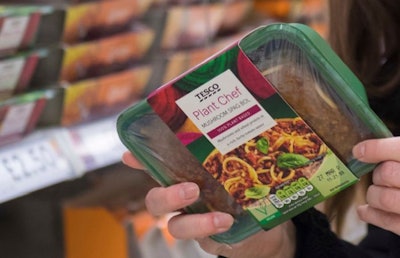
If you think that plant-based meat alternatives are simply a fad you may have to think again.
The market penetration of plant-based meat alternatives shows little sign of slowing and has recently received a boost following U.K.-based retailer Tesco’s announcement that it is taking a number of significant steps to boost its plant-based meat offerings.
The decision may currently apply to its U.K. operations only but, before you think that what is happening over there won’t happen over here, don’t forget that Tesco is one of the world’s largest retailers with outlets in numerous countries, so its plans really are worth noting.
So what is the company up to?
Tesco has announced that it has set a target for plant-based meat alternatives in an attempt to halve food production’s environmental impact.
Working with conservation organization WWF, the company has committed to a 300% increase in its sales of meat alternatives by 2025, along with a wider set of sustainability measures.
All-store roll-out
The company is planning to introduce and increase plant-based alternatives across all of its stores, with products available across 20 categories, and it aims to make them affordable so that price is not a barrier to purchasing.
It also plans to make these products visible, placing alternatives next to meat versions, and will work with suppliers to introduce innovations.
Moreover, Tesco has committed to publishing details of the sales of its plant-based proteins as a percentage of overall protein sales every year so that progress can be tracked.
As part of its sustainability commitment, the company, along with WWF, has developed what it calls its Sustainable Basket Metric, which aims to halve the environmental impact of the U.K. shopping basket, and the two organizations are calling on others to consider the framework as a way of making the food system more sustainable.
Tesco says that food production, specifically meat and dairy production, has a significant impact on precious habitats, such as the Amazon and Cerrado regions of Brazil, and is acknowledged as a major contributor to climate change.
And Tesco is not alone in its sharpened focus on non-meat products. A few days earlier, U.K. supermarket chain Asda, until recently part of Walmart, announced that it would become the first U.K. supermarket to launch a vegan destination in store, with two bays entirely dedicated to plant-based products.
The company notes that, since 2019, searched for vegan lines on asda.com have increased by 275% and that, in response, vegan aisles will be launched across 359 stores. Asda will launch 104 new plant-based products to fill its aisles!
Unsurprisingly, animal protein suppliers to the two supermarket chains have been less than pleased by the announcements, and some have been more vocal than others.
The U.K.’s National Sheep Association, for example, has questioned the motives of the two supermarket chains, adding that we are now seeing mass-produced industrialized and processed foods being dressed up as sustainable food options. It went on to question the sustainability criteria in the supermarkets’ decisions and whether these were truly holistic, adding that the initiatives could simply be another way of increasing profit margins rather than being driven by concern for the planet.


















